...that is the question (apologies: Hamlet). At deadline for this edition of The 45th there is cautious optimism in Washington that President Trump will sign the bipartisan compromise legislation that provides limited funding for border security, and ensures the US government will remain open for business until the end of this fiscal year.
This sentiment is in spite of the fact that the headline numbers in the deal are far from what President Trump has insisted on. The agreement reached by the Republican and Democratic leaders of the House and Senate Appropriations Committees provides for new barrier assets of some US$1.375 billion covering 55 miles of the border, compared to the US$5.7 billion that Trump has demanded for some 225 miles of border. Democrats did budge on the number of beds for the detention of immigrants.
So on its face, not a good deal for Trump. And he has expressed very serious reservations. A few hours ago at a cabinet meeting in the White House, Trump said: “Am I happy at first glance? The answer is no, I’m not, I’m not happy. It’s not going to do the trick, but I’m adding things to it and when you add whatever I have to add, it’s all going to happen where we’re going to build a beautiful big strong wall.”
Trump still has to weather the blowback from both hardline border stalwarts in the House, and Fox News. On Monday night, Fox's Sean Hannity said: "On this new, so-called compromise, I'm getting details... 1.3 billion? That's not a — not even a wall, a barrier?… Any Republican that supports this garbage compromise, you will have to explain." Laura Ingraham and Ann Coulter have also weighed in. And from Rep. Mark Meadows (R-NC) of the Freedom Caucus in the House: "This does not represent a fraction of what the president has promised the American people. I don't speak for the president but I can't imagine he will be applauding something so lacking."
These are two powerful political factors that effectively forced Trump into tanking the border security legislation in December, triggering the longest government shutdown in US history. So, why is it more likely than not that Trump will sign this deal?
Trump believes he retains the ability to supplement the money in the legislation with “executive action”. In recent days, the mood seems to have shifted away from a declaration of a national emergency – which would be quite Draconian – to issuing administrative edicts to re-allocate already-appropriated funds from military construction and disaster relief accounts. This will still be challenged in court, to be sure, but the White House lawyers are laying the groundwork for using this mechanism to open pools of money for the wall.
Senate Republican Leader Mitch McConnell today sent the strongest cautionary note to the White House: “I hope he’ll sign it. I think he got a pretty good deal.” Just to drive the point home further, McConnell did not rule out a veto override.
Trump obviously believes the issue is political gold for him – that his base loves it. He rode high on the immigration bronco at the rally in El Paso on Monday night. He can milk it again at other key pressure points later this year – most notably, September 30, when funding for all government agencies expires.
With the upcoming summit with Kim Jong Un in Hanoi, and with China trade talks demanding a favourable resolution in March, why carry shutdown baggage into the two most important diplomatic initiatives of 2019?
Trump is notoriously unpredictable. We do not know if he has read Hamlet. We will see if he takes arms against a sea of troubles.






